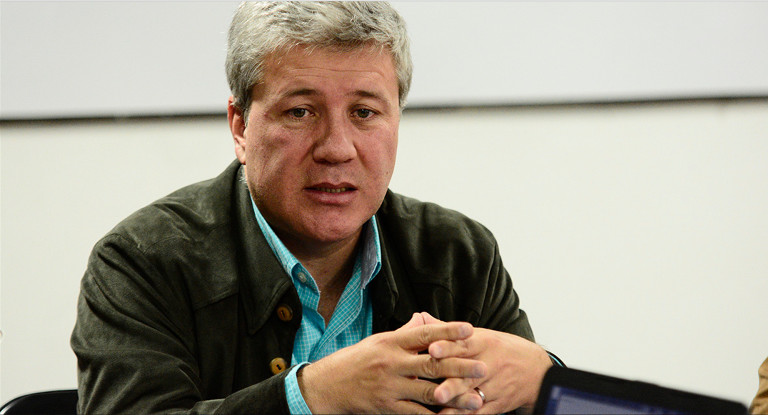
Juan Fernando Londoño: Thoughts and perspectives on the Colombian Peace Agreement
On October 26th, Juan Fernando Londoño, a renowned Colombian lawyer, economist and Conservative politician, visited Carleton University to lecture on the complexities of achieving peace and the impacts of peace on the region.
I was excited and intrigued, as the referendum had occurred not too long before the lecture would take place. I registered, hoping to be enlightened by his knowledge and personal experience resulting from the peace making process in Colombia. When October 26th rolled around, I was disappointed by the turnout; there were 6 of us in the room, including one professor, two friends I had convinced to come along, and myself. Seems like Colombians and students in Ottawa were just as interested in being part of a solution as the 38% of Colombians who voted on the day of the referendum. A lack of motivation and political participation transcend national boundaries, I guess.
Londoño began by speaking to the issues that plague Colombia’s so-called democratic system. He believes a lack of land reform/land distribution, a lack of state, a democracy based on the participation of a few, and drug trafficking have prevented us from moving forward in an effective manner.
He began by stating the Colombian Congress is not representative of the Colombian population. On the contrary, the interests represented in this political arena are largely attributed to the Colombian elite, who force top-down decision-making processes on the Colombian population. As a result, Colombian public policies are ineffective for addressing inequality because they’re designed to serve the interests of those who are already part of the system, creating a self-perpetuating cycle of poverty. Essentially, poverty in Colombia has moved from an economic issue to a political one. A peace agreement that is all encompassing must demand for participatory democracy, an accountable government, and better guarantees for those who hold opposing views. Power relations need to be changed in order to employ a sustainable and effective peace agreement in the future.
Besides democratic reforms, the peace agreement was also designed to address rural reforms. Londoño believes Colombia does not have the adequate state capacity or institutions to provide political rights for the people. In consequence, Colombia has misused available lands, (un)consciously maintaining a patron-client system. Development plans are needed in order to remedy our current system, or lack thereof, of land distribution, in addition to strengthening social institutions to enforce these norms.
Drug trafficking was also highlighted by Londoño. Substitution of coca crops and alternative types of development are needed in order to avoid the creation of small criminal gangs and other types of illicit networks. Further, demobilization, disarmament and restitution were incorporated in the peace agreement as ex-guerrilla members will be reintegrated into rural communities.
In my opinion, the most important point made by Londoño is that regarding the transitional justice system. No matter what happens, the government must ensure the conflict ends with justice. But how can we be sure justice has been achieved? How can we incorporate the different perceptions and definitions of what justice actually means? Who should be brought to justice when other groups, such as political leaders and NGOs, were systematically involved in the situation? We need to reveal the truth about what happened in Colombia. We need to place the victims at the center of the issue.
In conclusion, I believe the Colombian people didn’t vote for war by voting ‘no’ in the plebiscite; rather, the Colombian people voted ‘no’ because they wanted/believed a better offer would materialize. Now that the people have spoken, the ideal situation would be a new agreement that encompasses the interests and needs of 40+ million individuals. For this to occur, half of the population must move away from their current position and way of thought. Is this feasible in a country where the only form of “state” most individuals have seen is the military? Who do we trust when historically, the state has led us down time and time again? How can we achieve an agreement that will please both the Colombian elite and the Colombian poor given their deep and imbedded differences in perception and experience of the crisis? If you ask me, this is much easier said then done.
Juan Fernando Londoño is a member of the government team that negotiated the second point of the peace agreement with the FARC, and has been acting as an external consultant for the overall process. He has served as Deputy Interior Minister between 2011 and 2012, and as a governor in charge of several Colombian departments (provinces). He is currently the director of the Centre for Analysis and Public Affairs, a consulting firm dedicated to the promotion of better relationships between the public and the private sectors.
Julie Moreno
Environmental Biologist, Consultant and Advisor
7yShort and Clear, a must read for those ones interested in Colombian affairs.
Manager, Project Delivery Mexico Office
7yExcellent article...
Environmental Planning & Compliance | Project Management | Biodiversity & Habitat Protection | Compliance Audits | Freshwater & Marine Ecology | Highly Complex Pipeline Projects | Data Analytics | Envirom. Risk Factors
7yVery well written!
Health Information Management
7yGreat article.